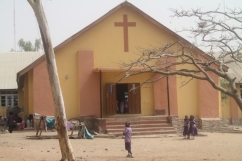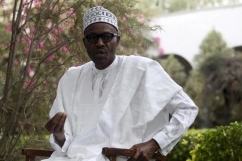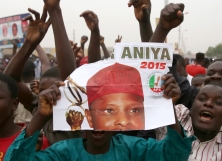Nigerians have once again gone to the polls for the final stage of the country's elections, two weeks after former-president Goodluck Jonathan was unseated by Muhammadu Buhari.
Voters are now choosing their state governors, who are among the most influential politicians in Nigeria, and the process is expected to heighten tensions across the country. According to Reuters, candidates in past governorship elections have used underhand tactics - snatching ballot boxes, manipulating voter turn-out and engaging in thuggery and intimidation.
Voting began at 8am this morning in some states, and police have already fired warning shots into the air to disperse a mob of some 2,000 people in Port Harcourt, Rivers State, who gathered to protest the late arrival of voting materials. Rivers is a key battleground, along with Lagos and the northern swing state of Kaduna.
Ban Ki-moon, the Secretary General of the UN, yesterday issued a statement urging Nigerians to repeat the peaceful process of the presidential elections.
When the two ran against each other in 2011 and Jonathan won, Buhari claimed that voting had been rigged, and his supporters began targeting Christian communities in widespread attacks that left an estimated 800 dead. "People were murdered, women were raped and this ultimately sparked retributory violence in areas such as the southern part Kaduna State where Christian communities were larger," a regional expert who wished to remain anonymous told Christian Today.
Following his defeat by more than 2.5 million votes two weeks ago, Jonathan phoned Buhari to concede, and urged his supporters to accept the result. This unprecedented move was widely considered to signal that the country had turned a corner in its bid for true democracy.
"The Secretary-General wishes to congratulate once again the people and Government of Nigeria for the peaceful manner in which the Presidential and Parliamentary Elections were conducted on 28 and 29 March. The statesmanship demonstrated by the political leadership has marked a significant milestone in the country's democratic process," the spokesperson for Ban Ki-moon said in a statement.
"He hopes the same conditions will prevail in the conduct of the gubernatorial and State House Assembly elections on 11 April. He calls on all political leaders throughout Nigeria to continue to uphold their commitments under the Abuja Accords and to refrain from and immediately condemn any inflammatory statements that amount to an incitement to violence."
However, a Nigerian official told Reuters that local people were more invested in the local process, and so the governorship elections were likely to be "slightly dirtier, a bit rougher in some places".
"The federal government is like no-man's land," said Folarin Gbadebo-Smith, head of Nigeria's Centre for Public Policy Alternatives.
In all, 30 states hold elections, with six sitting them out having had by-elections in the last few years. The new governors will take office on May 29, as will Buhari.
"The Nigerian army has directed all units to remain vigilant ... to prevent any attempt to endanger the lives of Nigerians," the army said in a statement on Friday.
Biometric voting cards that were used for the first time in last month's vote, and helped prevent fraudulent practices like multiple voting or ballot box stuffing, were again being used.
"The card reader is the only way that rigging on a large scale can be stopped in this country," Abubakar Momoh, of the Independent National Electoral Commission (INEC), told Reuters.
Additional reporting by Reuters
















